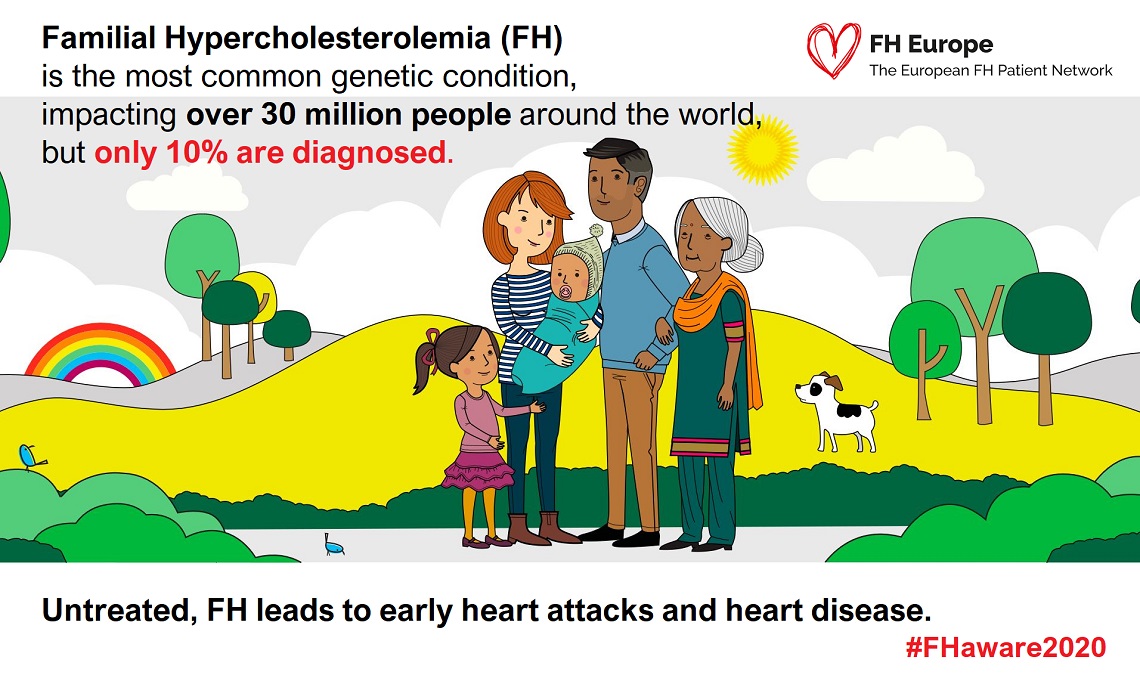#FHaware2020 – A multi-stakeholder collaboration to resolve the burden of FH (Guest blog)
Every year, on September 24th, the international Familial Hypercholesterolemia (FH) community celebrates FH Awareness Day, or even an FH Week to link to the World Heart Day.
Back in 1998 the World Health Organization raised the issue of Familial Hypercholesterolemia[1], calling it a grave public health concern. Yet, over the last, 20 years little improvement has been made for those born with the condition…
Familial Hypercholesterolemia, or FH for short, means inherited, dangerously elevated cholesterol. It is undoubtedly a huge public health problem. First, it is the most common genetic condition, affecting about 1 in 250 people. Second, despite all the available research and knowledge, it remains vastly undetected. For every 10 persons born with FH, 9 are undiagnosed by their doctors. In consequence - even though life-saving medications to lower cholesterol in those with FH are available, this lack of disease awareness leads to undertreatment of people with the condition. Further, despite the just published 2019 EAS-ESC Guidelines on management of dyslipidaemia[2], the latest research shows, that high risk patients with FH do not always receive all available treatment options due to access issues.

www.fheurope.org
Published earlier this year, under the umbrella of World Heart Federation, the Global Call to Action on FH[3] (GCtA), combines perspectives of patients, clinicians, advocacy organizations, scientific associations and public health officials to increase awareness, diagnosis, and treatment of FH and its rare and severe form - Homozygous FH.
Every year, on September 24th, the international FH community celebrates FH Awareness Day, or even an FH Week to link to the World Heart Day. In year 2020 is not just another campaign aimed at making as much noise as possible. The COVID pandemic highlights the gravity of inherited high cholesterol leading to premature CVD, making people who suffer from it a very high-risk group. In this context, it is a necessity to make FH an international public health priority. The GCtA on FH outlines 9 actionable recommendations incl. Awareness; Advocacy; Screening, testing, and diagnosis; Treatment; Severe and homozygous FH; Family-based care; Registries; Research; Cost and Value, to make it happen.
The number one recommendation of the GCtA is raising awareness of FH, both among the general public and the medical community. Yet, I dare say the most critical recommendation should be collaboration! Resolving the problem of FH concerns everyone from policymakers, health authorities, healthcare professionals, researchers, insurers and the pharma industry to the patient and advocacy groups. But most importantly it concerns people and their families. Fighting FH requires brave and innovative approaches, open communication, meaningful engagement and a long-term commitment on everyone’s part, including resources and funding. Finally, it needs a change in social perception, attached stigma, emotional burden and discrimination.
Too much time has been wasted, too many lives have been lost, the next generations are being impacted by lack of recognition. Hear it for yourself in the “From the Heart” words of patients. To end it with a personal call to action - please do get your cholesterol levels checked, especially if you have a family history or heart attacks or strokes.
The FH Awareness Day 2020 campaign is organized in partnership with the FH Europe Networks’ Members, World Heart Organization, International Atherosclerosis Society, European Atherosclerosis Society, EAS FHSC, European Association for Preventative Cardiology, ScreenPro FH, Global Heart Hub, Global Alliance for Patient Access, and supported by Amgen, Sanofi, Silence Therapeutics.
[1] Report of a second WHO Consultation Familial Hypercholesterolemia, Geneva, 4Sept 1998 https://apps.who.int/iris/bitstream/handle/10665/66346/WHO_HGN_FH_CONS_99.2.pdf?sequence=1&isAllowed=y
[2] 2019 ESC/EAS Guidelines for the management of dyslipidaemias: lipid modification to reduce cardiovascular risk: The Task Force for the management of dyslipidaemias of the European Society of Cardiology (ESC) and European Atherosclerosis Society (EAS), https://academic.oup.com/eurheartj/article/41/1/111/5556353
[3] Reducing the Clinical and Public Health Burden of Familial Hypercholesterolemia. A Global Call to Action, https://jamanetwork.com/journals/jamacardiology/article-abstract/2758279?guestAccessKey=b6ee57bf-29e2-452a-a6ef-79e4055da8c0&utm_source=For_The_Media&utm_medium=referral&utm_campaign=ftm_links&utm_content=tfl&utm_term=010220